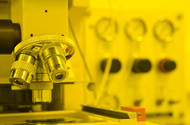Nanotechnology Nightmares For Skincare
Apr 21st 2021
Posted by Amrita Aromatherapy
Whenever scientists discover they can do something, they get so excited about the possibilities of making applications for this discovery (and making money) that they forget about the consequences. Look at Genetically Modified Organisms and other gene manipulations, for example. Now, they have discovered they can manipulate matter on the tiny “nano” scale (thousands of times tinier than a human hair) and create products, which they are forcing upon us. But the risks for us are extremely high. I would like to thank one of our affiliates for alerting me of this issue via their blog organicclothing.blogs.com.
For example, they can create nano-gold, which is only a few dozen atoms wide and which behaves differently in some ways to normal gold. You may have heard the expression that the whole is more than the sum of its parts. Well, this appears to actually be the case in that the nano-version of elements can often behave differently to the normal sized version.
Nano-particles sometimes become “reactive” instead of being inert. It is this “reactivity” which makes nanotechnology so scary. Yet, the nano-scientists still claim something is safe just because the normal sized version of it is safe. They know they can’t possibly test all possible things the nano-particles could come into contact with, so they can never really test their safety. Just like with GMO research, the supposed safety tests are generally done by in-house scientists, and so they decide what to test it with and which results to include or ignore. We end up being the lab rats, so to speak.
They have developed sunscreens, which have nano-particles of zinc oxide, which will not cause that chalky white residue on the skin. Initial safety studies have stated they are safe, but if you read the fine print in these studies, they aren’t so sure if they will be safe if your skin isn’t perfect. For example, they don’t know what will happen if you have skin problems like psoriasis, eczema, or cuts or burns.
They don’t know if these particles, which are small enough to pass through the skin 1 and go into the circulatory system, our organs and even into our brains, will then react with other particles in the body and what effect this will have2. We take antioxidants to neutralize free radicals. But these nano-particles could be creating free radicals. It’s like creating stray bullets and seeing what they hit.
I don’t mean to be alarmist, but it is important to bring this to people’s attention so that it can be stopped before it goes too much further. Already, they are appearing in everything you buy from skincare, anti-fungal sprays, cleaning products, air purifiers, children’s pencils to sheets and clothes, and many other products will have them in it 3. For example, they are creating nanotechnology textiles, which, may be wrinkle-free but have dire consequences for our health. There are over 400 companies worldwide working on nanotechnology products.
Many well-known cosmetic companies are already using plastic micro-beads in their facial scrubs (and some states are trying to ban them as they don’t want plastic to flow into their water supplies). So, you can be sure they are also planning to use nanotechnology. Some companies such as Bionova, Chanel, Chantecaille, Christian Dior, Kara Vita, Coppertone, Juvena, Lancome, Banana Boat, Philips, L.L. Bean, Remington, Samsung (e.g. in one of their air purifiers) and others claim they already using nanotechnology in some of their products. Some even put “Nano” in the product name.
Even governments are expressing concern. For example, the British Government 4 in 2005 cautioned companies and consumers on the unknown effects of nano-particles and said that just because a substance is safe in its normal size, doesn’t mean that it will be safe when it is nano-sized. The Australian Government’s Department of Health and Ageing said studies have shown that the nano-particles of zinc oxide and titanium dioxide used in sunblocks can induce free radicals5. This may cause cellular mutation and damage.
Even nanotechnology scientist studies are showing they may cause DNA damage (which makes sense given that diameter of DNA is approximately two nanometers wide). The FDA and even the Organic Trade Association in the US have not yet taken a stand against nanotechnology. However, there are experts at the University of Wisconsin that have collated a lot of information about the risks 6.
So, take a stand against nanotechnology by sharing this blog with your friends, and use Amrita Aromatherapy’s skincare products instead and use essential oils as your cleaners. If anyone has ideas as how best we can stop the introduction of this technology, please comment below.
Sources:
1 http://www.ncbi.nlm.nih.gov/pubmed/27052385
2 http://www.news-medical.net/life-sciences/Safety-of-Nanoparticles.aspx
3 http://www.nanotechproject.org/cpi/
4 http://www.hse.gov.uk/research/rrpdf/rr274.pdf
6 http://ice.chem.wisc.edu/NanoDecisions/PDF/RiskAndSafety.pdf and http://ice.chem.wisc.edu/NanoDecisions/index.html
Disclaimer: The statements made on this page have not been evaluated by the U.S. Food and Drug Administration (FDA). They are not intended to diagnose, cure or prevent any disease. If a condition persists, please contact your physician or healthcare provider. The information provided is not a substitute for a face-to-face consultation with a healthcare provider, and should not be construed as medical advice.
Original Published: 2016-04-14 / Last Modified: 2021-10-11

